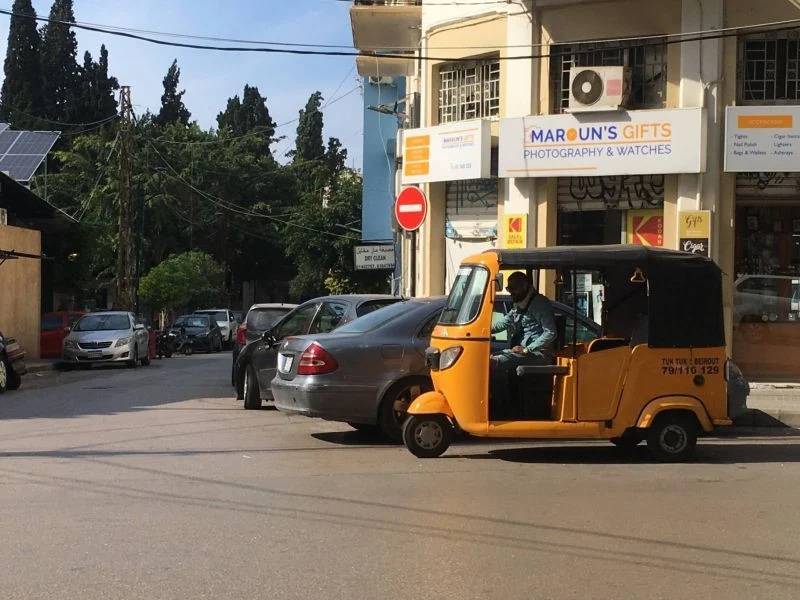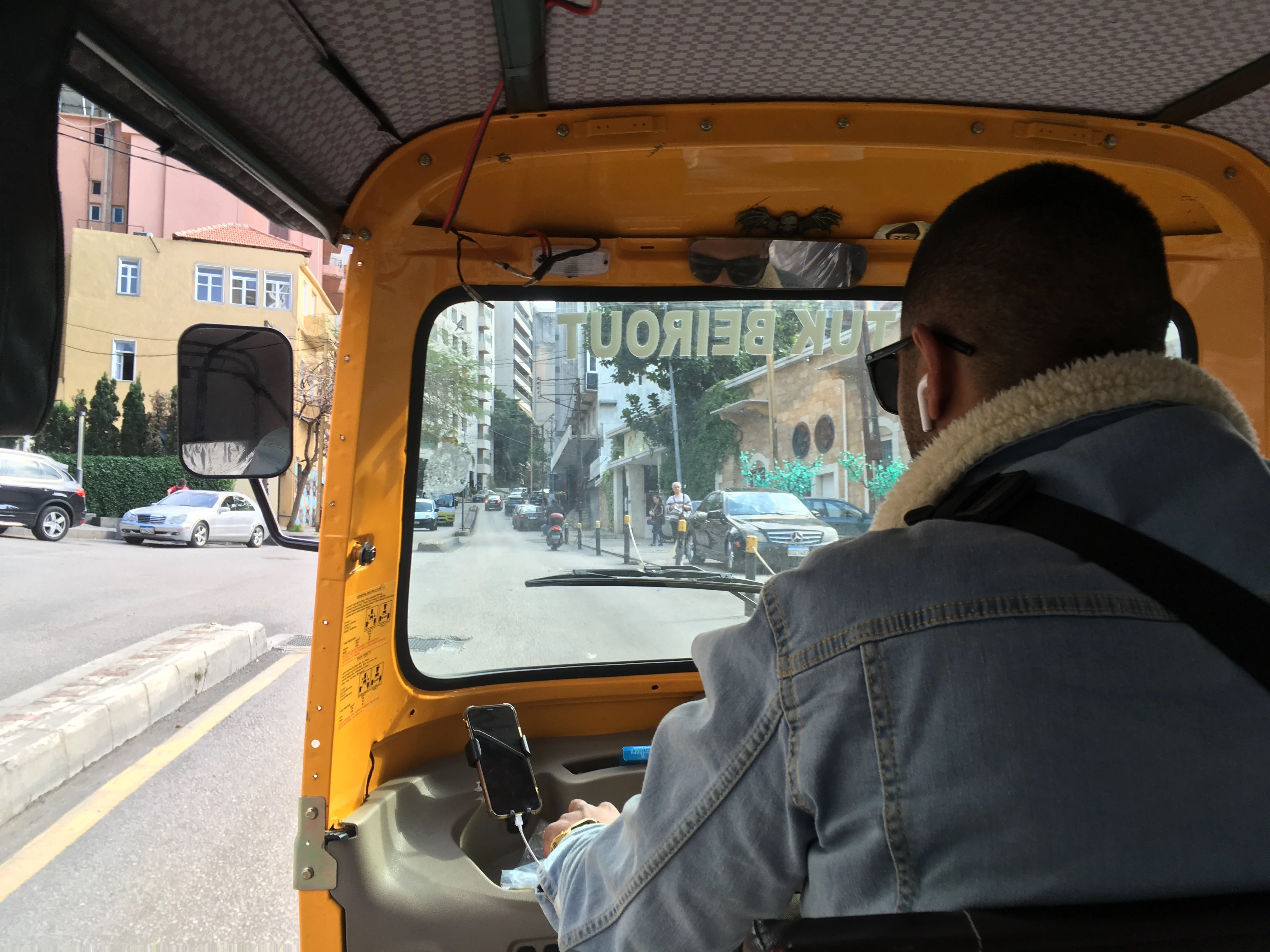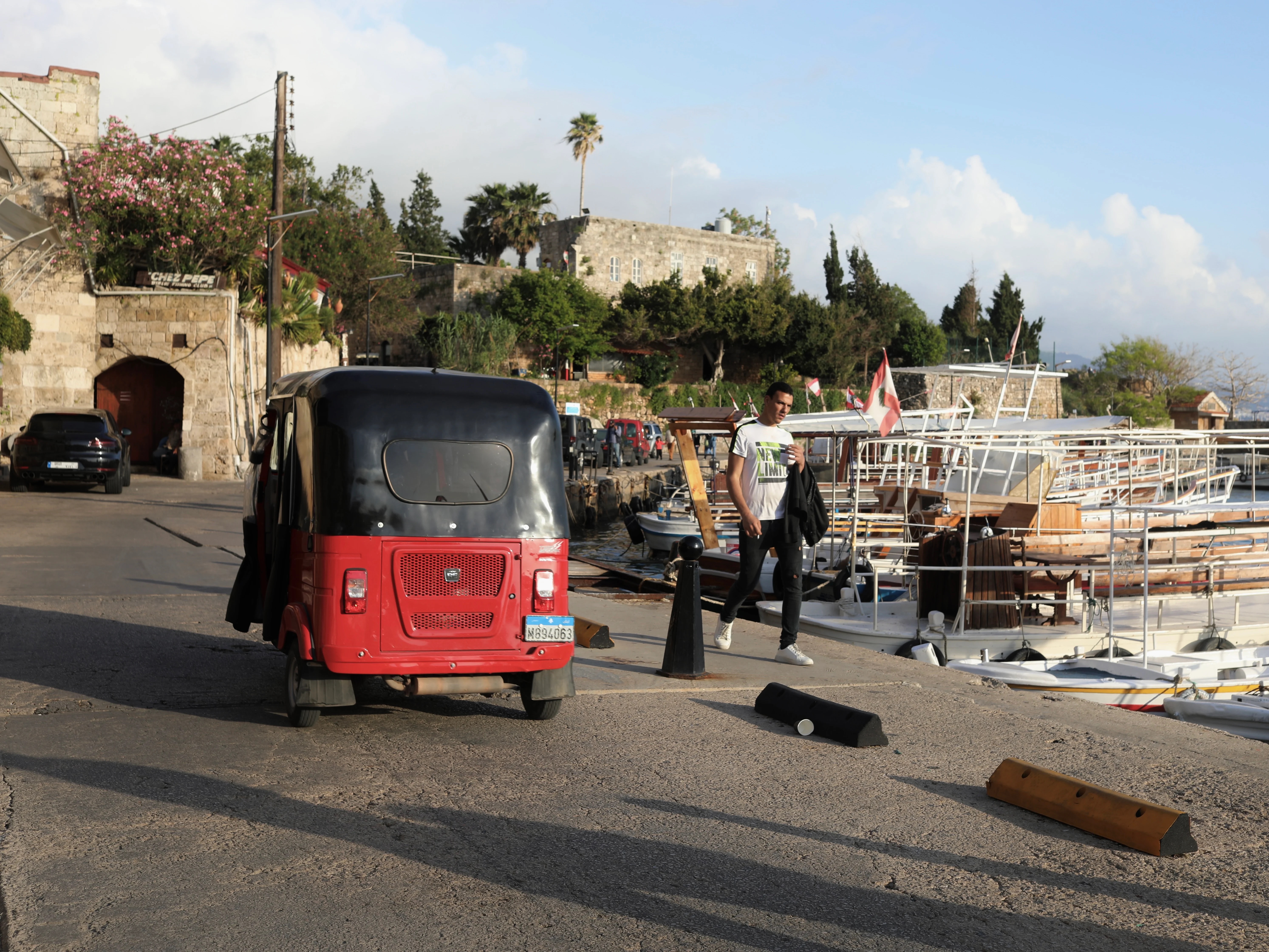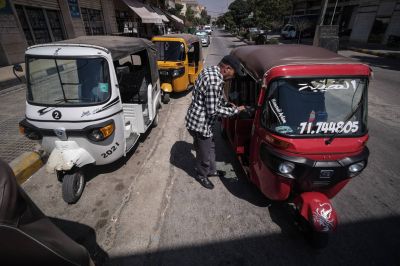
Mohammad's tuk tuk on Armenia Street in Mar Mikhael, Beirut. (Credit: Nada Ghosn)
The days when one had to travel thousands of kilometers to take a selfie aboard an exotic, modernized taxi-scooter with a metal cart are gone. The tuk tuk, which has long been a popular transportation means for the working classes in South Asia, has become part of the daily life of the Lebanese.
Already made available to tourists by private companies in the seaside towns of Jbeil and Batroun, and very much used by the residents of Akkar, Tripoli and the Bekaa Valley since the beginning of the economic crisis in 2019, tuk tuks are now appearing in the streets of Beirut and its suburbs.
“This means of transport is becoming more and more popular in the capital, because it is simple, fast and much more affordable,” said Mohammad, 27, a former motorcycle cab driver for the well-known Bolt ride-sharing platform.
Faced with soaring gasoline prices, he decided to invest in a tuk tuk a few months ago. He paid $2,800 for it, but it was worth it, he said. This fuel-efficient vehicle can carry up to five passengers in addition to the driver: two in the front and three in the back seat.
 Mohammad aboard his tuk tuk in the streets of Mar Mikhael in Beirut. (Credit: Nada Ghosn)
Mohammad aboard his tuk tuk in the streets of Mar Mikhael in Beirut. (Credit: Nada Ghosn)
‘I’m tired of hearing cab drivers complain’
“I drive some customers every day to work. Others call me on the weekends if they want a ride, sometimes outside Beirut,” explained Mohammad, who is an Egyptian citizen but has a Lebanese mother and who lives in Burj Hammoud.
“It did not take my customers long to become tuk tuk fans, because they were already motorcycle cab users,” he said. Like two-wheelers, this mode of transportation allows you to squeeze between cars, while offering more safety thanks to its protective side edges.”
With a minimum fare of LL100,000 (around $1 at the parallel market exchange rate), Mohammad’s tuk tuk attracts passengers from all walks of life and ages, allowing its owner to secure between $10 and $25 a day, sufficient to support his wife and their two children. While waiting for the creation of an application focusing on this mode of transportation, he opened an Instagram page that has attracted thousands of followers.
Nariman works at an optician’s in Sassine Square, Achrafieh. Every day, this 29-year-old single woman commutes from her home in Dekwaneh to work and back in Mohammad’s tuk-tuk for a monthly fee of $50, which is half the cost of a shared cab for the same period. This is a good solution to compensate for the drop in her income, which she says has been halved since the beginning of the economic crisis.
“The tuk tuk is an easy, direct and friendly way to travel. Mohammad has become my friend,” she said. “One always has to bargain [the fee] before one can get in a shared cab. I don’t have the time or the budget for that. Besides, I’m tired of hearing the drivers complain during the ride and beg for more money.”
 A tuk tuk in Jbeil. (Credit: Mathieu Karam)
A tuk tuk in Jbeil. (Credit: Mathieu Karam)
‘Responsible for a decrease of more than half in our activity’
Many cab drivers, however, consider tuk tuks unfair competition, just like motorcycles, low-cost transport platforms and foreign drivers. This is largely because tuk tuks have not been registered as public transportation, unlike professional cabs.
Protests by cab drivers in early May clearly expressed this discontent. “Vehicles not registered with the Public Works and Transport Ministry are responsible for a decrease of more than half in our activity,” said Hassan Wazni, head of the taxi drivers’ union in Lebanon.
The union filed a complaint with the ministry, asking for the sector to be regulated. “This means that unlicensed drivers [would] declare their activity, pay taxes and coordinate their fares with licensed cab drivers,” said Wazni.
Caretaker Transport Minister Ali Hamieh did not respond to L’Orient-Le Jour’s request for comment on the matter.
On Monday, in response to recent protests by cab drivers, caretaker Interior Bassam Mawlawi issued a circular ordering the Internal Security Forces (ISF) to intensify their prosecution of drivers operating with private plates or with a fake license plate.
Mawlawi called for taking all necessary measures to fight against illegal platforms and applications dedicated to the public transport of people or goods, in coordination with the judicial authorities concerned.
In another circular, he called for the shutdown of the Bolt app, until the legality of its activities in Lebanon is verified.
“I would prefer to be registered with the ministry,” said George, a barber who recently invested in a tuk tuk on the advice of his colleagues already in the business. “We have no choice; the situation forces us to find additional sources of] income,” added the 30-year-old.
“I take between LL50,000 and LL80,000 depending on the customers. Sometimes I don’t ask for money if I see that the passengers can’t afford it. I feel like I’m doing a good deed. What can we do in the face of this never-ending crisis?”
This article was originally published in French in L'Orient-Le Jour. Translation by Joelle El Khoury.

